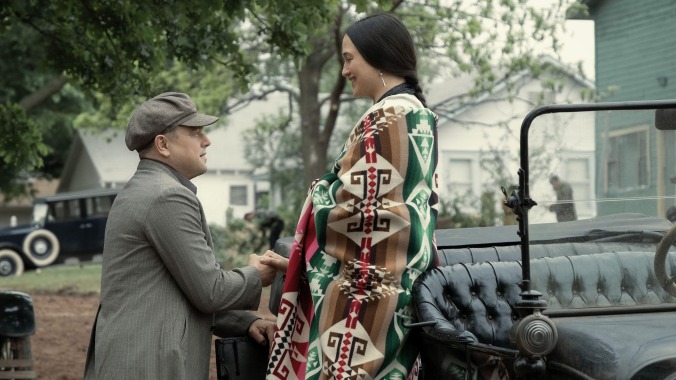Killers Of The Flower Moon review: Martin Scorsese's uniquely American tragedy
Leonardo DiCaprio, Robert De Niro and Lily Gladstone star in a vast true-crime drama that shines an overdue light on the Osage murders of the 1920s

In a pivotal scene late in Killers Of The Flower Moon, a wife asks her husband a straightforward yes or no question. His hesitancy and inability to give her the answer she so clearly desires and deserves is at the heart of this complex character study from master filmmaker Martin Scorsese. Killers Of The Flower Moon derives its story from a very dark chapter in early 20th-century American history, the murder of the Osage indigenous people by white men for their oil wealth. What makes it fascinating is the specific angle the film takes to tackle this vast story; the film is a portrait of an ineffectual man who still manages to inflict a lot of harm. Someone who, against his better judgment and despite knowing all the facts, chooses to do the wrong thing time and again. It’s an epic tale told through the lens of an intimate, elusive, and ultimately tragic love story.
Adapted by Eric Roth and Scorsese and based on David Grann’s best-selling book, Killers Of The Flower Moon is about Ernest Burkhart (Leonardo DiCaprio), a recently discharged World War I veteran and his courtship of Mollie Kyle (Lily Gladstone), an Osage woman who comes from money and is looking to start a family. Ernest has no discernible skills or appetite for work; he just needs a wife with money. That’s when his uncle, William “King’’ Hale (Robert De Niro), sends him in Mollie’s direction. Surprisingly, they fall for each other. Not immediately, though. They take their time sizing each other up since they both know their motives might not be entirely honest. Tentatively they find warmth and companionship in each other. However, before long, they get enmeshed in Hale’s diabolical schemes.
As Burkhart, DiCaprio transforms, but not in the way an actor in a prestige film is expected to, with makeup prosthetics and weight fluctuations. Rather smartly, DiCaprio chooses a character he hasn’t played before; a befuddled and dumb man who keeps getting himself in trouble. He’s a man who makes stupid choices but can’t help himself. All of this is played on his face; his reaction to what’s happening around him is what pops. He registers Burkhart’s every bit of confusion, bemusement, and bewilderment. It’s a performance of a thousand faces registering one man’s grand failure.
Unlike DiCaprio, whose body seems to never stop moving, Gladstone gives a quiet performance of slow, determined moves. Her Mollie might not say much, but she’s never passive. She moves the way that someone with a lifelong history of facing and overcoming casual racism would. The introduction of the character in voiceover belies the source of its strength. As Mollie tries to find out what’s happening to her and her people, and why everyone around her is being murdered, Gladstone modulates her voice to convey the injustice that’s happening. She plays Mollie as someone resigned to her fate but determined to survive against the odds.






![HBO teases new Euphoria, Larry David, and much more in 2026 sizzle reel [Updated]](https://img.pastemagazine.com/wp-content/avuploads/2025/12/12100344/MixCollage-12-Dec-2025-09-56-AM-9137.jpg)

































